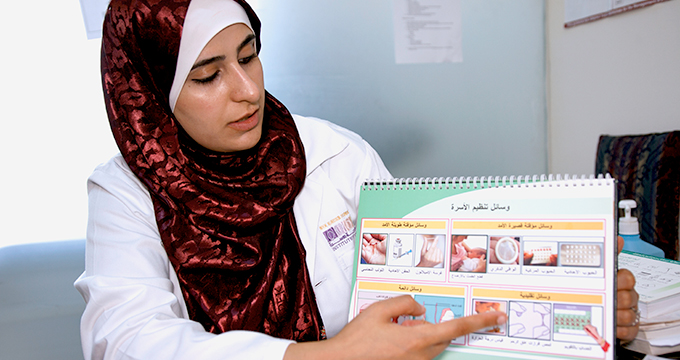Quality Health and Well-being
Supporting refugees to make their own decisions about their bodies and health

Providing refugees with essential healthcare services including Sexual Reproductive and Maternal Health Services
In crisis, conflict, and refugee settings around the world, global health faces immense challenges.
People forced to flee their homes often lack access to essential healthcare, leading to major health issues. Many face violence, poor sexual reproductive health, malnutrition, and infectious diseases. But the challenges go deeper.
Refugees and displaced populations often struggle to access healthcare due to discrimination and exclusion. This creates gaps in vital services, leaving many without the care they need.
In these situations, the most vulnerable suffer the most. Women, children, adolescents, gender-diverse LGBTQ+ people, and people living with disabilities are disproportionately affected. They often lack access to sexual reproductive health services, and maternal and child health services, increasing the risk of early and unwanted pregnancies, maternal mortality, morbidity, and child health problems.

According to WHO, 20 in 1,000 (or 1 in 49) women will die from maternal causes in poor countries. In Sub-Saharan Africa, 1 in 13 children die before their first birthday. Adolescent girls are especially vulnerable to sexual and gender-based violence, and harmful practices like child marriages and they lack access to contraceptive services and comprehensive education which expose them to early and unwanted pregnancies increasing their risk of unsafe abortions and childbirth-related problems. In these harsh circumstances, dignity is often lost.
People deserve to receive healthcare with respect, yet conflict and crisis settings can strip this away.
Hope for Refugees International works at the root of global health hardships facing refugees and asylum seekers, supporting communities to transform harmful power, gender dynamics, and policy barriers to create an environment that makes healthy behavior possible for everyone.
Why Invest in quality health and wellbeing for refugees and IDPs
In crisis, conflict, and refugee settings around the world, global health faces immense challenges.
People forced to flee their homes often lack access to essential healthcare, leading to major health issues. Many face violence, poor sexual reproductive health, malnutrition, and infectious diseases. But the challenges go deeper. Refugees and displaced populations often struggle to access healthcare due to discrimination and exclusion. This creates gaps in vital services, leaving many without the care they need.
In these situations, the most vulnerable suffer the most.
Women, children, adolescents, gender-diverse LGBTQ+ people, and people living with disabilities are disproportionately affected. They often lack access to sexual reproductive health services, and maternal and child health services, increasing the risk of early and unwanted pregnancies, maternal mortality, morbidity, and child health problems.
To achieve the goal of quality health and well-being programs for refugees and asylum seekers we;
Enhance access to quality, equitable, and inclusive health care services, including sexual and reproductive health (SRH) and rights services, in refugee humanitarian and fragile settings.
Work with national and sub-national level health authorities, NGOs, and community-based organizations to improve and advance the local health system
strengthening.
Building capacity and support refugees and marginalized population groups, especially adolescents and young people, LGBTQ+ youths, and youth living with disabilities, to exercise their right to health including SRHR.
Preparing and
responding to humanitarian and global health emergency preparedness by leveraging our relationships with governments, frontline health workers, and communities
Our commitment to meeting the health needs of marginalized youth

Supporting refugee and marginalized population groups, especially refugee adolescent girls and young people, refugees LGBTQ+ individuals, and youth living with disabilities is key to exercising the right to health.
Hope for Refugees is committed to providing high-quality health information and services to youth with the vision of a world where all refugee young people in their diversity are empowered and equipped with the knowledge, skills, capacity, and opportunities they need to live quality and healthy lives with equity, dignity, and opportunities to realize their full potential.